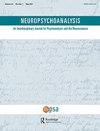Comment on “Some Implications of New Developments in Neurobiology for Psychoanalytic Object Relations Theory” by Otto Kernberg
Q3 Psychology
引用次数: 1
Abstract
ABSTRACT Otto Kernberg provides us with a detailed and sophisticated account of how contemporary evidence from neuroscience can be fitted into the ego psychological-framed object relations theory that he has been developing for many years. In this commentary, I frame the clinical lessons to be drawn from this and other neuroscience evidence by considering four questions that every psychoanalyst answers, explicitly or implicitly, whenever they are at work. What is it that is unconscious in a session? What is it that is repeated to produce the problems patients have? What goes on in a session? How can analysis work and what should we communicate to patients? Although knowledge of neurobiology cannot substitute for clear theory about how to conduct psychoanalysis or the need to manage the emotional challenge of adopting a psychanalytically framed disposition, I suggest it can help us to distinguish aspects of theory and practice that do not stand the test of time and so help to clean up and clarify the specificity of psychoanalysis.评奥托·克恩伯格《神经生物学新发展对精神分析客体关系理论的启示
摘要Otto Kernberg为我们提供了一个详细而复杂的描述,说明了神经科学的当代证据如何融入他多年来发展的自我-心理框架-客体关系理论。在这篇评论中,我通过考虑每一位精神分析师在工作时都会明确或隐含地回答的四个问题,从这一证据和其他神经科学证据中总结出临床经验教训。什么是在一次会话中无意识的?是什么反复出现了病人的问题?会话中发生了什么?分析如何工作?我们应该与患者沟通什么?尽管神经生物学的知识不能取代关于如何进行心理分析的明确理论,也不能取代采用心理分析框架性格来应对情绪挑战的必要性,但我认为它可以帮助我们区分理论和实践中不经得起时间考验的方面,从而有助于清理和澄清心理分析的特殊性。
本文章由计算机程序翻译,如有差异,请以英文原文为准。
求助全文
约1分钟内获得全文
求助全文
来源期刊

Neuropsychoanalysis
Psychology-Neuropsychology and Physiological Psychology
CiteScore
2.50
自引率
0.00%
发文量
24
 求助内容:
求助内容: 应助结果提醒方式:
应助结果提醒方式:


